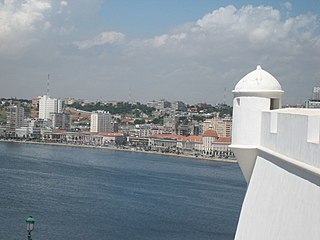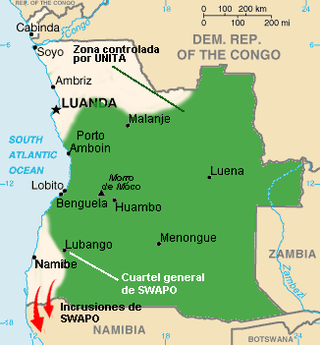
The United Nations Mission in Sierra Leone (UNAMSIL) was a United Nations peacekeeping operation in Sierra Leone from 1999 to 2006. It was created by the United Nations Security Council in October 1999 to help with the implementation of the Lomé Peace Accord, an agreement intended to end the Sierra Leonean civil war. UNAMSIL expanded in size several times in 2000 and 2001. It concluded its mandate at the end of 2005, the Security Council having declared that its mission was complete.

The United Nations Mission in Liberia (UNMIL) was a United Nations peacekeeping operation established in September 2003 to monitor a ceasefire agreement in Liberia following the resignation of President Charles Taylor and the conclusion of the Second Liberian Civil War (1999–2003). At its peak it consisted of up to 15,000 UN military personnel and 1,115 police officers, along with civilian political advisors and aid workers.

The United Nations Integrated Mission in East Timor (UNMIT) was established on 25 August 2006 by UN Security Council Resolution 1704. Its objectives are "to support the Government in consolidating stability, enhancing a culture of democratic governance, and facilitating political dialogue among Timorese stakeholders, in their efforts to bring about a process of national reconciliation and to foster social cohesion". In its most recent resolution on UNMIT, the Council extended its mandate until 26 February 2012. UNMIT and ISF troops left the country at the end of 2012.
In the 1990s in Angola, the last decade of the Angolan Civil War (1975–2002), the Angolan government transitioned from a nominally communist state to a nominally democratic one, a move made possible by political changes abroad and military victories at home. Namibia's declaration of independence, internationally recognized on April 1, eliminated the southwestern front of combat as South African forces withdrew to the east. The MPLA abolished the one-party system in June and rejected Marxist-Leninism at the MPLA's third Congress in December, formally changing the party's name from the MPLA-PT to the MPLA. The National Assembly passed law 12/91 in May 1991, coinciding with the withdrawal of the last Cuban troops, defining Angola as a "democratic state based on the rule of law" with a multi-party system.

United Nations Security Council resolution 804, adopted unanimously on 29 January 1993, after reaffirming resolutions 696 (1991), 747 (1992), 785 (1992) and 793 (1992), and expressing its concern at lack of implementation of the "Acordos de Paz para Angola" in Angola, the council approved a recommendation by the Secretary-General Boutros Boutros-Ghali to extend the mandate of the United Nations Angola Verification Mission II for a further three months until 30 April 1993.

United Nations Security Council resolution 851, adopted unanimously on 15 July 1993, after reaffirming resolutions 696 (1991), 747 (1992), 785 (1992), 793 (1992), 804 (1993), 811 (1993), 823 (1993) and 834 (1993), the Council noted the continuing deterioration of the situation in Angola and extended the mandate of the United Nations Angola Verification Mission II until 15 September 1993, discussing further the peace process in the country.

United Nations Security Council resolution 1008, adopted unanimously on 7 August 1995, after reaffirming Resolution 696 (1991) and all subsequent resolutions on Angola, the Council discussed the monitoring of a ceasefire and implementation of peace accords, and extended the mandate of the United Nations Angola Verification Mission III until 8 February 1996.

United Nations Security Council resolution 1037, adopted unanimously on 15 January 1996, after recalling previous resolutions on Croatia including resolutions 1023 (1995) and 1025 (1995), the council established the United Nations Transitional Authority for Eastern Slavonia, Baranja and Western Syrmia (UNTAES) for an initial period of 12 months.

United Nations Security Council resolution 1279, adopted unanimously on 30 November 1999, after recalling resolutions 1234 (1999), 1258 (1999) and 1273 (1999) on situation in the Democratic Republic of the Congo, the council established the United Nations Mission in the Democratic Republic of Congo (MONUC) for an initial period until 1 March 2000.

United Nations Security Council resolution 1289 was adopted unanimously on 7 February 2000. After recalling resolutions 1171 (1998), 1181 (1998), 1231 (1999), 1260 (1999), 1265 (1999) and 1270 (1999) on the situation in Sierra Leone, the Security Council extended the mandate of the United Nations Mission in Sierra Leone (UNAMSIL) for a period of six months and expanded its military component.

United Nations Security Council resolution 1294, adopted unanimously on 13 April 2000, after reaffirming Resolution 696 (1991) and all subsequent resolutions on Angola, particularly Resolution 1268 (1999), the Council extended the mandate of the United Nations Office in Angola (UNOA) until 15 October 2000.

United Nations Security Council resolution 1410, adopted unanimously on 17 May 2002, after recalling previous resolutions on East Timor (Timor-Leste), particularly resolutions 1272 (1999), 1338 (2001) and 1392 (2002), the council established the United Nations Mission of Support to East Timor (UNMISET) to replace the United Nations Transitional Administration in East Timor (UNTAET).

United Nations Security Council resolution 1433, adopted unanimously on 15 August 2002, after recalling 696 (1991) and subsequent resolutions on the situation in Angola, particularly 1268 (1999), the Council authorised the establishment of the United Nations Mission in Angola (UNMA) as a follow-on mission to the United Nations Office in Angola (UNOA). Resolution 1433 was adopted on the same day the Council extended the suspension of travel restrictions against UNITA officials in Resolution 1432 (2002).

United Nations Security Council resolution 1479, adopted unanimously on 13 May 2003, after reaffirming Resolution 1464 (2003) on the situation in Côte d'Ivoire and resolutions 1460 (2003) and 1467 (2003), the council established the United Nations Mission in Côte d'Ivoire (MINUCI) after determining the situation in the country to be a threat to international peace and security in the region.

United Nations Security Council resolution 1509, adopted unanimously on 19 September 2003, after recalling all previous resolutions on the situation in Liberia, including Resolution 1497 (2003), the council established the 15,000-strong United Nations Mission in Liberia (UNMIL) to assist in implementing a ceasefire and peace agreement.

United Nations Security Council resolution 1528, adopted unanimously on 27 February 2004, after recalling resolutions 1464 (2003), 1479 (2003), 1498 (2003), 1514 (2003) and 1527 (2004) on the situation in Côte d'Ivoire, the council established the United Nations Operation in Côte d'Ivoire (UNOCI) for an initial period of twelve months.

United Nations Security Council Resolution 1545, adopted unanimously on 21 May 2004, after recalling all resolutions on the situation in Burundi, particularly Resolution 1375 (2001), the council established the United Nations Operation in Burundi (ONUB) to bring about peace and national reconciliation in the country.

United Nations Security Council Resolution 1590, adopted unanimously on 24 March 2005, after recalling resolutions 1547 (2004), 1556 (2004), 1564 (2004), 1574 (2004), 1585 (2005) and 1588 (2005) on the situation in Sudan, the Council established the United Nations Mission in Sudan (UNMIS) for an initial period of six months.
United Nations Security Council Resolution 1778 was unanimously adopted on 25 September 2007.
United Nations Security Council Resolution 1861 was unanimously adopted on 14 January 2009.















